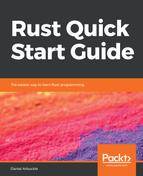As we've seen before, when we implement behavior for a type, the functions we define have self, &self, or &mut self as the first parameter. We now understand enough to recognize that that means that self is either moved (or copied) into the scope of the function, borrowed, or mutably borrowed. Which one we choose to use can have some pretty important consequences.
In all three cases, self means the data value that this function was called through. If we have a u32 variable named x and we tell Rust to x.pow(3), the pow function implemented for u32 will receive two parameters: the value of x as self, and 3 as the second parameter.
The same rules apply to moving, borrowing, and mutably borrowing the self value as they apply to any other value. If we currently have any borrows of a value, we can't mutably borrow it into self, nor can we move it (because that would invalidate the existing borrows). If we currently have a mutable borrow of the value, we can't borrow it or move it into self, because mutable borrows do not allow anyone else to borrow or change the value. Similarly, borrowing into a function's self affects how we can access the data in other places, because it is a borrow, and there are rules about how borrows coexist.
